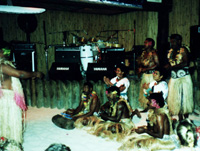 Photo.
Photo. Dancing in Fiji is
great entertainment for travellers.
Click on the link for more information on the website: http://www.world-tourism.org/market_research/facts/market_trends.htm.
Tourism can be defined as the act of travel for the purpose of recreation,
and the provision of services for this act. A tourist is someone who travels at
least eighty kilometres (fifty miles) from home for the purpose of recreation,
as defined by the World Tourism Organization (a United Nations body).
A more comprehensive definition would be that tourism is a service industry,
comprising a number of tangible and intangible components. The tangible elements
include transport systems - air, rail, road, water and now, space; hospitality
services - accommodation, foods and beverages, tours, souvenirs; and related
services such as banking, insurance and safety & security. The intangible
elements include: rest and relaxation, culture, escape, adventure, new and
different experiences.http://www.reference.com/browse/wiki/Tourism
Special forms of tourism
For the past few
decades other forms of tourism, also known as niche tourism, have been becoming
more popular, particularly:
Adventure tourism: Tourism involving travel in rugged regions, or adventurous
sports such as mountaineering and hiking (tramping).
Agritourism: Farm based tourism, helping to support the local agricultural
economy.
Armchair tourism and virtual tourism: not travelling physically, but
exploring the world through internet, books, TV, etc.
Cultural tourism: Includes urban tourism, visiting historical or interesting
cities, such as London, Paris, Prague, Rome, Cairo, Beijing, Kyoto, and
experiencing their cultural heritages. May also consist of specialized cultural
experiences, such as art museum tourism where one visits many art museums during
the tour, or opera tourism where one sees many operas or concerts during the
tour.
Disaster tourism: travelling to a disaster scene not primarily for
helping, but because one finds it interesting to see. It can be a problem if it
hinders rescue, relief and repair work.
Drug tourism (for use in that country, or, legally often extremely risky, for
taking home)
Ecotourism: Sustainable tourism which has minimal impact on the environment,
such as safaris (Kenya) and Rainforests (Belize), or national parks.
Educational tourism: May involve travelling to an education institution, a
wooded retreat or some other destination in order to take personal-interest
classes, such as cooking classes with a famous chef or crafts classes.
Gambling tourism, e.g. to Atlantic City, Las Vegas, Macau or Monte Carlo for
the purpose of gambling at the casinos there.
Gay tourism: Tourism marketed to gays who wish to travel to gay-friendly
destinations which feature a gay infrastructure (bars, businesses, restaurants,
hotels, nightlife, etc.), the opportunity to socialize with other gays, and the
feeling that one can relax safely among other gay people.
Heritage tourism: Visiting historical or industrial sites, such as old
canals, railways, battlegrounds, etc.
Health tourism: Usually to escape from cities or relieve stress, perhaps for
some 'fun in the sun', etc. Often to "health spas".
Hobby tourism: Tourism alone or with groups to participate in hobby
interests, to meet others with similar interests, or to experience something
pertinent to the hobby. Examples might be garden tours, ham radio DXpeditions,
or square dance cruises.
Inclusive tourism: Tourism marketed to those with
functional limits or disabilities. Referred to as "Tourism for All" in some
regions. Destinations often employ Universal Design and Universal Destination
Development principles.
Medical tourism, e.g.:
for what is illegal in one's own country, e.g.
abortion, euthanasia; for instance, euthanasia for non-citizens is provided by
Dignitas in Switzerland.
for advanced care that is not available in one's
own country
in the case that there are long waiting lists in one's own
country
for use of free or cheap health care organisations
Perpetual tourism: Wealthy individuals always on vacation, some of them, for
tax purposes, to avoid being resident in any country.
Regional tourism Tourism bundle of few country in the region, using one of
the country as the transit point. The country of transit point is usually a
country with good transport infrastructure. e.g. Singapore is the base for
tourism for South East Asia due to its strategic location and good transport
infrastructure.
Sex tourism: mostly men from First World countries visiting Third World
countries for purpose of engaging in sexual acts, usually with inexpensive local
prostitutes. This form of tourism is often cited the principal way that
paedophiles can hire child prostitutes.
Sport tourism: Skiing, golf and scuba diving are popular ways to spend a
vacation. Also in this category is vacationing at the winter home of one's
favorite baseball team, and seeing them play everyday.
Space tourism
Vacilando is a special kind of wanderer for whom the process of travelling is
more important than the destination.
Stein Morten Lund, 30 December 2005
Additional information
World Tourism Rankings:
The World Tourism Organization compiles the World Tourism Rankings. Number of
foreign tourists in 2002/2003 etc:
Click on the link for more information:
http://www.reference.com/browse/wiki/World_Tourism_Rankings
